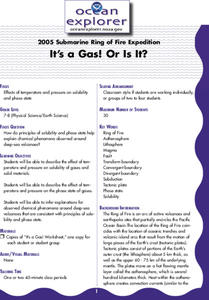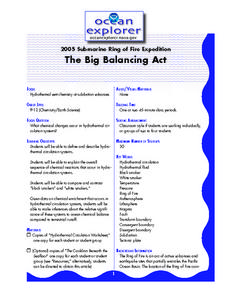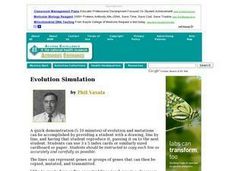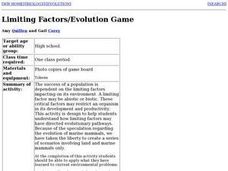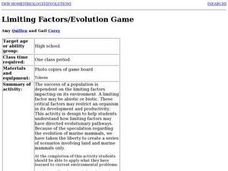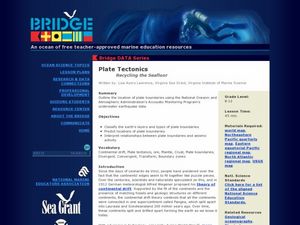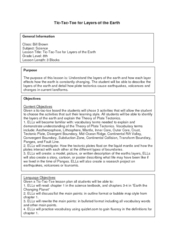Curated OER
It's a Gas! Or is it?
Students discover the principles of solubility and phase state and their influence on chemical phenomena observed around deep-sea volcanoes. They describe the effect of temperature and pressure on solubility of gasses and solid materials.
Curated OER
The Big Balancing Act
Students describe chemical changes occurring in hydrothermal circulation systems. They make inferences about the significance of these systems to ocean chemical balance compared to terrestrial runoff.
Curated OER
Modeling Plate Tectonics
Students investigate the four different ways tectonic plates interact at their boundaries. Using simple available materials, they create models to simulate these interactions present at plate boundaries.
Curated OER
Normal (dip-slip) Earthquake!
Students label the fault lines and tectonic plate boundaries on the world map. For this earth science lesson, students simulate ocean floor formation using CEENboTs. They explain the causes of earthquakes.
Curated OER
Focusing on Lenses
Students explore scientific observations by examining the parts of a microscope. In this optics lesson, students discuss the importance of a focal point and focal distance when utilizing an optical device such as a microscope. Students...
Curated OER
Evolution Simulation
Students simulate the process of evolution. Using index cards, they copy a drawing. Each subsequent drawing is sent around the room. The results are compared to the original drawing.
Curated OER
Limiting Factors/Evolution Game
Students play a board game with provided cards which help them realize that limiting factors may restrict an organism in its development and productivity and direct evolutionary pathways.
Curated OER
Limiting Factors/ Evolution Game
Pupils will understand the relationship between limiting factors and evolution. They will be able to hypothesize possible evolutionary pathways for modern day organisms.
Curated OER
Refraction and Lenses
In this lenses worksheet, students will review refraction through lenses by reading pairs of statements and circling the correct ones. Then students will read 9 statements and indicate if the statement is referring to a concave lens,...
Curated OER
Diagnostic Test: Angles & Parallel Lines
In this diagnostic test learning exercise, students solve problems involving angles, parallel lines, and perpendicular lines. They identify alternate interior angles, alternate exterior angles, and corresponding angles. Students find...
Curated OER
Living With the Heat: The Ring of Fire
Students investigate the planet Earth's infamous ring of fire and the life that thrives from it. In this ocean environment lesson plan, students investigate hydrothermal vents and how organisms thrive off their heat. Students...
Curated OER
Contributions of Ancient Egypt and China
Second graders study the contributions of Ancient Egypt and China, which have had an impact on world history, with emphasis on written language, laws, calendars, and architectural monuments such as the Pyramids and the Great Wall of China.
Curated OER
Plate Tectonic - Volcanoes Pre Lab
Second graders draw and compare parts of volcano. They investigate parts of a volcano and distinguish between magma and lava.
Curated OER
Natural Disasters
Learners work together in groups to travel throughout the room to different stations. They practice making different natural disasters at each station. They also examine fault lines and the supercontinent Pangaea.
Curated OER
The Dynamic Earth
Students participate in assessments related to the layers of the Earth. They read chapters of text, answer questions, watch videos, and identify and label continents and oceans on a map. They design posters, create vocabulary cards,...
Curated OER
The Theory of Evolution
In this theory of evolution worksheet, high schoolers review vocabulary words associated with evolution including the different types of evolution patters. This worksheet has 5 true or false and 5 matching questions.
Curated OER
Forces Inside the Earth
In this faults worksheet, students identify the three types of faults and the characteristics that define a normal fault, reverse fault, and a strike-slip fault. This worksheet has 3 fill in the blank and 3 short answer questions.
Curated OER
Iterating Linear Functions
Young scholars use a spreadsheet to investigate data. In this algebra lesson, students collect and graph data on a coordinate plane. They explain properties of a linear equation both algebraically and orally.
Curated OER
Iterating the Function and Complex Numbers
Students identify the end behavior of polynomial graphs. In this algebra lesson, students factor and solve quadratic and complex equations. They factor out negative roots and identify the real and imaginary parts of an equation.
Curated OER
Exploring Plate Tectonics
In this plate tectonics worksheet, students complete 8 fill in the blank questions on plate boundaries, 9 short answer questions on the Earth's crust and 5 fill in the blank on continental drift. There are 3 follow questions at the end.
Curated OER
Tracing the Roots of Modern Cities
Students identify several key inventions and other forms of technology that were part of city life during the classical Roman and Greek periods. They report on one characteristic or invention that is shared by modern and ancient cities.
Curated OER
Plate Tectonics: Recycling the Seafloor
Students classify earth's layers and plates using Ocean Seismicity data. In this plate tectonics lesson, students outline where the plate boundaries are on the world map. They then compare these predicted boundaries with USGS map of the...
Curated OER
A Model of Three Faults
Students investigate faults. In this science lesson, students explore the many stresses and strains in the earth's layers and research the types of faults in their state.
Curated OER
Tic-Tac-Toe for Layers of the Earth
Eighth graders identify the different layers of the earth. In this earth science lesson, 8th graders choose a project to do from a given list according to their learning style. They present their finished project in class.
